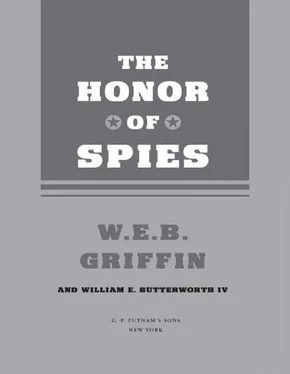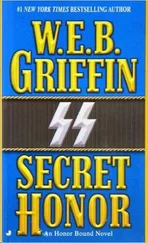W. IV - Honor Bound 05 - The Honor of Spies
Здесь есть возможность читать онлайн «W. IV - Honor Bound 05 - The Honor of Spies» весь текст электронной книги совершенно бесплатно (целиком полную версию без сокращений). В некоторых случаях можно слушать аудио, скачать через торрент в формате fb2 и присутствует краткое содержание. Год выпуска: 2009, ISBN: 2009, Издательство: Putnam Pub., Жанр: Старинная литература, на английском языке. Описание произведения, (предисловие) а так же отзывы посетителей доступны на портале библиотеки ЛибКат.
- Название:Honor Bound 05 - The Honor of Spies
- Автор:
- Издательство:Putnam Pub.
- Жанр:
- Год:2009
- ISBN:9780399155666
- Рейтинг книги:4 / 5. Голосов: 1
-
Избранное:Добавить в избранное
- Отзывы:
-
Ваша оценка:
- 80
- 1
- 2
- 3
- 4
- 5
Honor Bound 05 - The Honor of Spies: краткое содержание, описание и аннотация
Предлагаем к чтению аннотацию, описание, краткое содержание или предисловие (зависит от того, что написал сам автор книги «Honor Bound 05 - The Honor of Spies»). Если вы не нашли необходимую информацию о книге — напишите в комментариях, мы постараемся отыскать её.
Honor Bound 05 - The Honor of Spies — читать онлайн бесплатно полную книгу (весь текст) целиком
Ниже представлен текст книги, разбитый по страницам. Система сохранения места последней прочитанной страницы, позволяет с удобством читать онлайн бесплатно книгу «Honor Bound 05 - The Honor of Spies», без необходимости каждый раз заново искать на чём Вы остановились. Поставьте закладку, и сможете в любой момент перейти на страницу, на которой закончили чтение.
Интервал:
Закладка:
She shook her head, and said, "Yes, sir."
"Give the nice lady your briefcase, Len. And the pistol. We don't want to scare people at the Army-Navy Club."
V
[ONE]
Fuhrerhauptquartier Wolfsschanze
Near Rastenburg, Ostpreussen, Germany
0655 19 August 1943
Generalleutnant Graf Karl-Friedrich von Wachtstein--a short, slight, nearly bald, fifty-four-year-old--walked briskly down a cinder path from the Fuhrerhauptquartier bunker to the bunker in which Generalfeldmarschall Wilhelm Keitel, Germany's senior military officer--he was chief of the Oberkommando der Wehrmacht--had his quarters.
Wolfsschanze held fifty bunkers--ugly buildings with eight- and ten-foot-thick concrete walls and roofs. Wehrmacht engineers had begun--in great secrecy and on a cost-be-damned basis--the construction of "Wolf 's Lair" in 1940. A 3.5-square-kilometer area in the forest east of Rastenburg in East Prussia had been encircled with an electrified barbed-wire fence and minefields.
Next came the erection of another barbed-wire enclosure inside the outer barrier. Only then, within this interior barrier, had construction begun of the artillery-proof and aerial-bomb-proof bunkers. The compound had its own power-generating system, a railway station with a bomb-proof siding for the Fuhrer's private train, an airstrip (between the inner and outer fences), several mess halls, a movie theater, and a teahouse.
An SS-hauptsturmfuhrer and two enlisted men, all armed with Schmeisser machine pistols, stood outside the heavy steel door to Keitel's bunker.
"Generalleutnant von Wachtstein to see the generalfeldmarschall. I am ex pected."
The hauptsturmfuhrer clicked his heels and nodded to one of the enlisted men, who walked quickly to the steel door and pulled it open, standing to attention as von Wachtstein walked into the bunker.
Von Wachtstein found himself in a small room. An oberstleutnant, a stabsfeldwebel, and a feldwebel, who had been sitting behind a simple wooden table, jumped to their feet.
The oberstleutnant gave the straight-armed Nazi salute.
"Good morning, Herr General," he said. "You are expected. If you would be so good as to accompany the stabsfeldwebel?"
Von Wachtstein followed the warrant officer farther into the bunker to another steel door, which he pulled open just enough to admit his head. He announced, "Generalleutnant von Wachtstein, Herr Generalfeldmarschall."
"Admit him."
The door was opened wider. Von Wachtstein marched in, came to attention, and gave the Nazi salute.
Keitel, a tall erect man who was not wearing his tunic, had obviously just finished shaving; there was a blob of shaving cream next to his ear and another under his nose.
"Well?" he demanded.
"Reichsmarschall Goring, Herr Generalfeldmarschall, reports there is some mechanical difficulty with his aircraft, and there is no way he can get from Budapest here before three this afternoon, or later."
Keitel considered that a moment.
"In this regrettable circumstance, von Wachtstein, I see no alternative to you informing the Fuhrer. He will, of course, want to know of this incident as soon as possible."
"Jawohl, Herr Generalfeldmarschall."
The "incident" was the suicide of Generaloberst Hans Jeschonnek, chief of the general staff of the Luftwaffe, who had shot himself just after midnight.
Among his other duties, Jeschonnek, Goring's deputy, had been charged--personally, by the Fuhrer--with the protection of the rocket establishment at Peenemunde. Hitler believed that once rocket scientist Wernher von Braun "worked the bugs out" of the V2 missile, it would cow the English into suing for peace.
The V2, which had a speed of about a mile a second, carried 1,620 pounds of high explosive in its warhead. It had a range of two hundred miles, enough to reach large parts of England. The bugs that Hitler expected von Braun to soon work out concerned navigation. The best accuracy obtained so far was that half of all missiles launched could be reasonably expected to land within an eleven-mile circle.
The rockets considerably annoyed the British, but they didn't by any means cow them. Their solution to the problem was to ask the Americans to destroy Peenemunde with B-17 bombers, as Peenemunde was too small a target to be seen by their Lancaster bombers at night.
Jeschonnek was not only unable to stop the Americans, whose bombs just about destroyed the Peenemunde installation, but made things far worse for himself by deciding that a large formation of fighter aircraft near Berlin were American and ordering the Berlin antiaircraft to shoot them down. The attack had knocked nearly one hundred of them from the sky.
Unfortunately for the Reich, they turned out to be German fighter planes. When Jeschonnek learned of this, he put his pistol in his mouth and blew his brains all over the concrete walls of his bunker quarters.
The only question in von Wachtstein's mind about Jeschonnek's sui - cide was whether he had killed himself out of shame for failing to protect Peenemunde, or because nearly one hundred of his fighter pilots were dead because of his orders, or whether he did so rather than face Adolf Hitler's legendary wrath.
On his way back to the Fuhrerhauptquartier bunker, von Wachtstein wondered if Keitel had any inkling at all of the contempt von Wachtstein felt for him. And he felt that not only because the man--referred to by his colleagues as Lakaitel ("Little Lackey") and as the "Nodding Donkey"--was sending him to face Hitler's wrath.
Von Wachtstein considered Keitel a disgrace to the German officer corps. While Hitler had appointed himself Oberster Befehlshaber der Wehrmacht --Supreme Commander of the Armed Forces--it was still clearly the duty of his officers to advise him when they thought his judgment was wrong. Keitel never disagreed with anything Hitler decided.
Stalingrad was an example. Keitel never said a word when von Paulus, nearly out of ammunition and reduced to eating his horses, had requested permission to fight his way out of his encirclement, but Hitler instead ordered him to fight to the last man. Hitler had then promoted von Paulus to field marshal and pointedly told him that no German field marshal had ever surrendered, a clear suggestion that von Paulus was honor bound to commit suicide.
The result of that had been 150,000 German soldiers dead and 91,000 captured--von Paulus among them--when the Red Army ultimately and inevitably triumphed.
Von Wachtstein knew that not only had Keitel tacitly approved the horrors that Himmler's death squads had visited on Russian soldiers and civilians, but that he had personally ordered that French pilots flying in the Normandie-Niemen fighter regiment of the Soviet air force not be treated as prisoners of war when captured. He ordered them summarily executed.
Von Wachtstein thought again that Keitel--not Adolf Hitler himself--was the real reason he had joined Operation Valkyrie. Hitler was in power solely because Keitel and the clique that surrounded him kept him in power. If Keitel survived the attempt on Hitler's life, von Wachtstein would happily shoot him himself, or preside over the court of honor to strip him of his field marshal's baton before standing him against a wall. Or, better yet, hanging him.
SS-Obersturmfuhrer Otto Gunsche, a very handsome blond man in his early twenties, who was Hitler's personal adjutant, was sitting on a Louis XIV chair outside Hitler's living quarters, obviously waiting for the Fuhrer to appear.
"Gunsche, would you please ask the Fuhrer to receive me? It's quite important."
"Jeschonnek?"
"Has he heard?"
Gunsche shook his head.
"One moment, Herr General, I will ask."
Читать дальшеИнтервал:
Закладка:
Похожие книги на «Honor Bound 05 - The Honor of Spies»
Представляем Вашему вниманию похожие книги на «Honor Bound 05 - The Honor of Spies» списком для выбора. Мы отобрали схожую по названию и смыслу литературу в надежде предоставить читателям больше вариантов отыскать новые, интересные, ещё непрочитанные произведения.
Обсуждение, отзывы о книге «Honor Bound 05 - The Honor of Spies» и просто собственные мнения читателей. Оставьте ваши комментарии, напишите, что Вы думаете о произведении, его смысле или главных героях. Укажите что конкретно понравилось, а что нет, и почему Вы так считаете.












